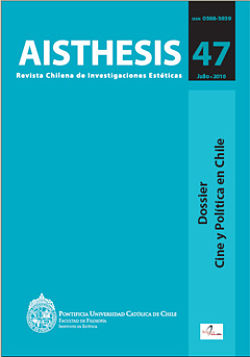Twice for Utopia: Latin American Film Festivals
Main Article Content
Abstract
The two Latin American film festivals that were carried out in Viña del Mar in 1967 and 1969 were connected by their themes: the bonds between films and politics. The exhibited films come from movements known as the «new cinema», which was opposed to the commercial films screened in movie theaters all around the continents. Most of them were trying to represent the social and politic reality in their countries. In parallel to the films screening, the invited filmmakers debated about themes that were relevant to context of the continent in those years (social inequality, cultural dependence, dictatorial regimes, police violence) as well as the aesthetics, cultural and political proposals in which every country based its cinematogrphic experiences. Thus, the following article will analyze the most important films and theoretical proposals that characterised those screening, as well as the invited Latin American filmmakers
Downloads
Article Details

This work is licensed under a Creative Commons Attribution-NonCommercial-ShareAlike 4.0 International License.
All contents of this electronic edition are distributed under the Creative Commons license of "Attribución-shareAlike 4.0 Internacional" (CC-BY-SA). Any total or partial reproduction of the material must mention its origin.
The rights of academic works published in this publication belong to their authors., who grant to AISTHESIS: Revista Chilena de Investigaciones Estéticas the license for its use. The management of the permits and the authorization of the publication of the images (or of any material) that contains copyright and its consequent rights of reproduction in this publication is the sole responsibility of the authors of the articles
